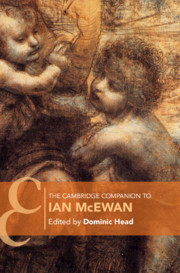Book contents
- The Cambridge Companion to Ian McEwan
- The Cambridge Companion to Ian McEwan
- Copyright page
- Contents
- Contributors
- Chronology
- Abbreviations
- Introduction
- 1 ‘Shock Lit’
- 2 Moral Dilemmas
- 3 Science and Climate Crisis
- 4 The Novel of Ideas
- 5 Cold War Fictions
- 6 The Construction of Childhood
- 7 The Public and the Private
- 8 Masculinities
- 9 The Novellas
- 10 Realist Legacies
- 11 Limited Modernism
- 12 Narrative Artifice
- Further Reading
- Index
- Cambridge Companions To…
7 - The Public and the Private
Published online by Cambridge University Press: 24 June 2019
- The Cambridge Companion to Ian McEwan
- The Cambridge Companion to Ian McEwan
- Copyright page
- Contents
- Contributors
- Chronology
- Abbreviations
- Introduction
- 1 ‘Shock Lit’
- 2 Moral Dilemmas
- 3 Science and Climate Crisis
- 4 The Novel of Ideas
- 5 Cold War Fictions
- 6 The Construction of Childhood
- 7 The Public and the Private
- 8 Masculinities
- 9 The Novellas
- 10 Realist Legacies
- 11 Limited Modernism
- 12 Narrative Artifice
- Further Reading
- Index
- Cambridge Companions To…
Summary
The interplay of the personal and the social is discussed with regard to McEwan’s output as a whole, but with particular reference to some of its more marginal texts, such as Amsterdam. Much of McEwan’s writing has rightly been seen as focused on public issues. For example, Amsterdam is a social satire; the oratorio text Or Shall We Die? aims to influence public debate about nuclear weapons. However, McEwan is also a chronicler of the personal and physical. For example, The Ploughman’s Lunch is about personal corruption as well as national mendacity. Indeed, throughout McEwan’s work, the personal and the public interweave. Interpersonal relations are also central to McEwan’s work. A typology of such relations is suggested based on closeness and disjunction, concealment and intrusion. Examples are drawn from a wide range of McEwan’s work. The motif of transvestism is given prominence.
Keywords
- Type
- Chapter
- Information
- The Cambridge Companion to Ian McEwan , pp. 106 - 119Publisher: Cambridge University PressPrint publication year: 2019
- 2
- Cited by

